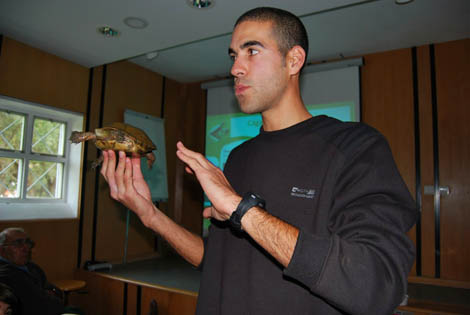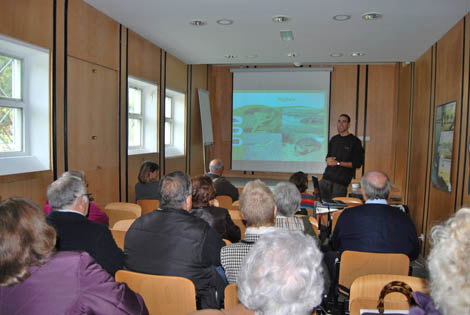 The Casa João Lúcio/ Ecoteca, in Olhão, promotes, this December, several guided tours to the space where João Lúcio, an illustrious citizen from Olhão, lived, as well as some workshops for specific audiences, as happened this week with a group of students from the Senior University of Olhão, who attended a presentation on tortoises by biologist Bruno Martins.
The Casa João Lúcio/ Ecoteca, in Olhão, promotes, this December, several guided tours to the space where João Lúcio, an illustrious citizen from Olhão, lived, as well as some workshops for specific audiences, as happened this week with a group of students from the Senior University of Olhão, who attended a presentation on tortoises by biologist Bruno Martins.
Among the various activities carried out there, in addition to this initiative carried out on the afternoon of Wednesday, December 5th, on December 4th, Casa João Lúcio received students from the EB 2,3 Paula Nogueira School, who visited this emblematic house and the exhibitions there and will welcome on the 17th and 18th of this month the children who participate in the Christmas Summer Camps in the Municipality of Olhão. On December 27, Casa João Lúcio also hosts a Kids Meeting throughout the day, with a guided tour of the house and exhibitions.
The approximately 30 students from the Senior University of Olhão, who participated this week in the workshop “Save Our Cágados” showed a lot of interest in the explanations given by biologist Bruno Martins, who has a grant from the University of Porto through the Life Trachemis project and is studying the community of turtles in some of the lagoons in the Ria Formosa area, to try to save and preserve them, to the detriment of others that are genuine pests.
 The teachings, guaranteed the spectators of this activity, “were very fruitful”. The seniors from Olhano heard the biologist explain, for example, which are the two species of Portuguese turtles: the Mediterranean (they only exist in the Iberian Peninsula, but despite that their extinction, currently, is of little concern) and the ribbed turtle (they exist in Europe, but in very little quantity, as such creations are already made in captivity, because they are threatened with extinction).
The teachings, guaranteed the spectators of this activity, “were very fruitful”. The seniors from Olhano heard the biologist explain, for example, which are the two species of Portuguese turtles: the Mediterranean (they only exist in the Iberian Peninsula, but despite that their extinction, currently, is of little concern) and the ribbed turtle (they exist in Europe, but in very little quantity, as such creations are already made in captivity, because they are threatened with extinction).
In addition to these, there is the Florida turtle, which can be three times larger than the Portuguese species and can become real pests, especially because people buy (it is illegal to sell these animals in stores) these reptiles while they are small and then when they grow and free them in nature, which causes real problems for other species due to their easy reproduction, eating fish, aquatic plants, amphibians, reptiles and even our small turtles.


















Comments